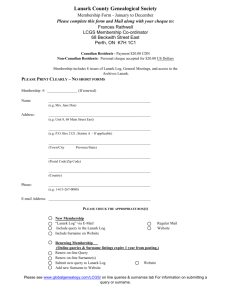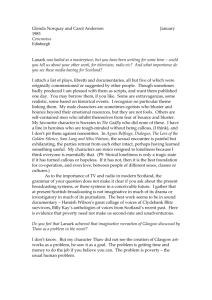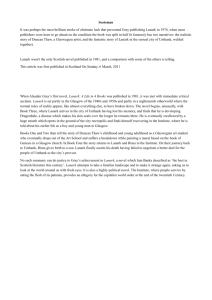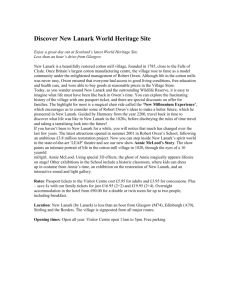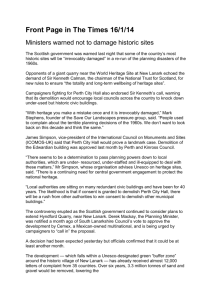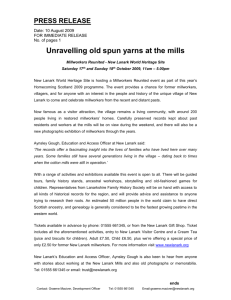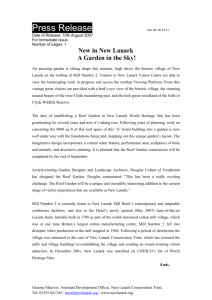Document
advertisement
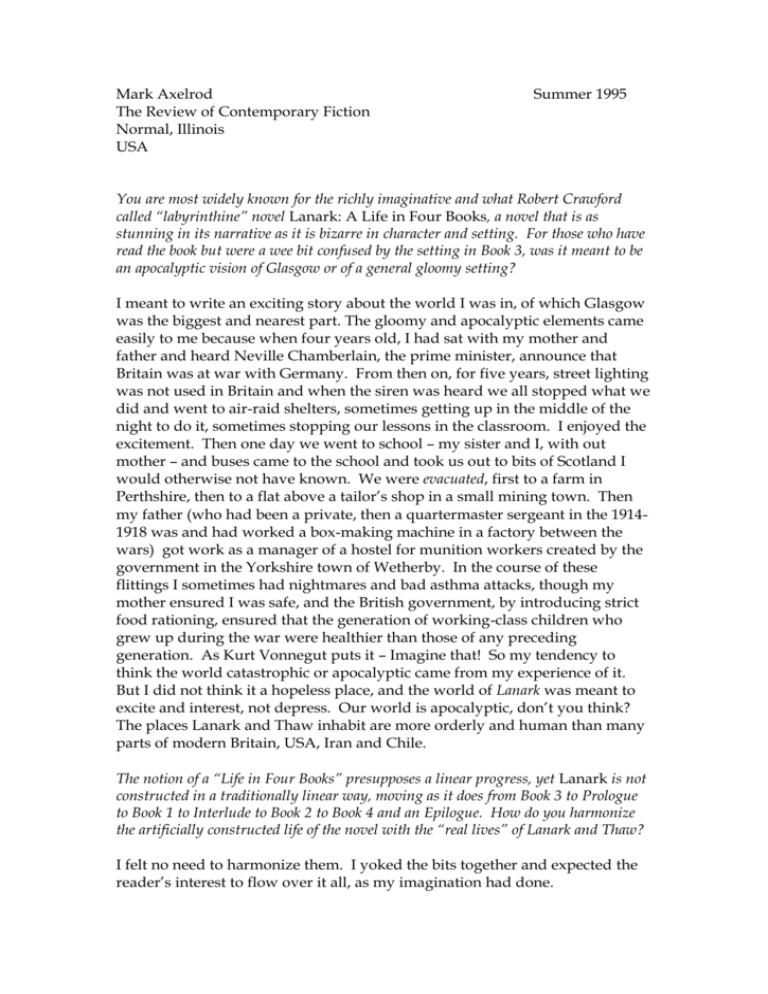
Mark Axelrod The Review of Contemporary Fiction Normal, Illinois USA Summer 1995 You are most widely known for the richly imaginative and what Robert Crawford called “labyrinthine” novel Lanark: A Life in Four Books, a novel that is as stunning in its narrative as it is bizarre in character and setting. For those who have read the book but were a wee bit confused by the setting in Book 3, was it meant to be an apocalyptic vision of Glasgow or of a general gloomy setting? I meant to write an exciting story about the world I was in, of which Glasgow was the biggest and nearest part. The gloomy and apocalyptic elements came easily to me because when four years old, I had sat with my mother and father and heard Neville Chamberlain, the prime minister, announce that Britain was at war with Germany. From then on, for five years, street lighting was not used in Britain and when the siren was heard we all stopped what we did and went to air-raid shelters, sometimes getting up in the middle of the night to do it, sometimes stopping our lessons in the classroom. I enjoyed the excitement. Then one day we went to school – my sister and I, with out mother – and buses came to the school and took us out to bits of Scotland I would otherwise not have known. We were evacuated, first to a farm in Perthshire, then to a flat above a tailor’s shop in a small mining town. Then my father (who had been a private, then a quartermaster sergeant in the 19141918 was and had worked a box-making machine in a factory between the wars) got work as a manager of a hostel for munition workers created by the government in the Yorkshire town of Wetherby. In the course of these flittings I sometimes had nightmares and bad asthma attacks, though my mother ensured I was safe, and the British government, by introducing strict food rationing, ensured that the generation of working-class children who grew up during the war were healthier than those of any preceding generation. As Kurt Vonnegut puts it – Imagine that! So my tendency to think the world catastrophic or apocalyptic came from my experience of it. But I did not think it a hopeless place, and the world of Lanark was meant to excite and interest, not depress. Our world is apocalyptic, don’t you think? The places Lanark and Thaw inhabit are more orderly and human than many parts of modern Britain, USA, Iran and Chile. The notion of a “Life in Four Books” presupposes a linear progress, yet Lanark is not constructed in a traditionally linear way, moving as it does from Book 3 to Prologue to Book 1 to Interlude to Book 2 to Book 4 and an Epilogue. How do you harmonize the artificially constructed life of the novel with the “real lives” of Lanark and Thaw? I felt no need to harmonize them. I yoked the bits together and expected the reader’s interest to flow over it all, as my imagination had done. Both Joseph Campbell and Mircea Eliade speak of quests as a kind of “enlightened return” unlike Nietzsche’s “eternal return” which is divorced from any kind of spiritual enlightenment. A number of novels of character, The Stranger, The Sorrows of Young Werther, Hunger, have elements of this quest motif. Lanark too seems bent on a quest. Did you have such a notion in mind when you wrote the novel and if so what was Lanark’s quest? The quest was to find more love and sunlight. He gets them on the last two pages. There are parts of Lanark that are reminiscent of Andrei Biely’s St Petersburg and John Barth’s Giles Goat-Boy. In St Petersburg it is the property of the city and its colours; in Goat-Boy it’s the bizarrely realistic (I refrain from using the term magically realistic) handling of institutional bureaucracies. Not that either text directly influenced your approach to Lanark, but what were some of the texts that did and why? The first book was probably Shaw’s Adventures of the Black Girl in Search of God, for my father once told me he read to me when I was very small, and I kept asking him, “Will the next God be the real one, daddy?” I read Ibsen’s Peer Gynt when an adolescent, in Archer’s translation. (My dad had become a Fabian socialist through his First World War experiences, so we had all Shaw’s plays and his “Quintessence of Ibsenism”, which probably put dad onto Ibsen.) Peer Gynt is the quest of nineteenth-century man in search of his soul or true self – it takes him through scenery as wild, yet oddly familiar, as Bunyan’s Pilgrim’s Progress, which I could not enjoy because I did not want to be a born-again Christian. Then there was Melville’s Moby Dick with its combination of great idioms: natural history, factory ship, oil industry, Shakespearean monologue, Yankee wise-cracks, Wordsworthian meditation. Then Kafka and Kafka and Kafka. I remember a children’s prose version of the Odyssey read when nine or ten. The idea of a voyage from one magic island to another gripped really hard. Of course the quest here was to get home again, but the journey interested me more than hope of arrival. There was also the Quest for the Golden Fleece in Kingsley’s The Heroes, the adventures of Jason and Thesus, the quest of Gawain in a child’s Mort d’Arture version – also Sinbad, whose adventures are all voyages in search of wealth by trade or good luck. Then I read Amos Tutuola’s The Palm Wine Drinkard, a quest into the African bush to bring a tapster back from the world of the dead, when the scenery and episodic nature of the story were very like those of Shaw’s Adventures of the Black Girl in Search of God. And these stories exalted because they let me into a life of important, surprising, dangerous adventures, while leaving me perfectly safe. But at the end, Kafka was the most useful, because his heroes were all dull strivers, heroic only in their persistence in a world like mine. The city where the bank official Joseph K struggles for acquittal from a nameless crime could easily have been Glasgow – the slums with law courts in their attics, the artist’s tenement studio, the foggy, nearly empty cathedral struck me as Glaswegian. So did the land surveyor’s struggle to get his position, his work in the town confirmed by the officialdom of the adjacent castle. But the quest of the young boy in Amerika – I forget his name – struck me hard, though I noticed it was based on Oliver Twist. The description of how he at last joins the Nature Circus of Arizona – the new deal which can employ all the homeless of America and Europe – was proof that even Kafka could write a good ending out of a world like mine – that human government was redeemable. That approach to institutional dogma and criteria, whether academic or nonacademic, seems to have been a part of your work as far back as the short story “The Wise Mouse”, written when you were in secondary school. Is this kind of obstreperousness a genetic perturbation of Alasdair Gray? If so, Why? My approach to institutional dogma and criteria – let’s call it, my approach to institutions – reflects their approach to me. Nations, cities, schools, marketing companies, hospitals, police forces have been made by people for the good of people. I cannot live without them, don’t want or expect to. But when we see them working to increase dirt, poverty, pain and death, then they have obviously gone wrong. Is it mere obstreperousness to show them wrong? The genetic perturbation you refer to is a sense of justice. Everyone suffers for it, so it is an ingredient in all fiction except the most blandly escapist. One cannot overlook the dual dimension of Duncan Thaw as an artist and a litterateur, a combination that is clearly expressed in your own work. Was there ever a preference for the word over the image or vice versa? Never. I preferred Disney films to all others as a child and their words and sounds and images were simultaneous. The first books I read had pictures in them. Your illustrations are visually unique and doubtlessly Gray. Where do they fit into the texts? In other words, do you think of them with the text, as a prelude, as an afterthought? As an afterthought. My illustrations are not essential to the text but intended to make it more enjoyable. With my paintings, the image is first, of course. I read somewhere that you declare you have no religion, yet a character like Duncan struggles with the Judeo-Christian perplexities of God. How do you reconcile that in your writing? I don’t reconcile it. I present it by (sometimes) describing a Thaw, a Lanark, a Jock McLeish haunted by an idea of God, which I am sure haunts many modern people without congregations who, doubting the eternity of mere selfish chaos, feel the possibility of eternal goodness. You spent a number of years, formative years, as a playwright and screenwriter before you began writing fiction. How did that training help you in your fiction? And did you ever think that you or anyone else could have scripted a novel like Lanark? You’re mistaken there. I started writing fiction – silly little stories – when quite small and started the Thaw part of Lanark when nineteen, not realizing the job would take twenty-five years. Meanwhile, I lived by art teaching, scene painting, portrait painting, then, by a piece of good luck, playwriting. The discipline of writing the novel helped the plays as much as vice versa, since both used a lot of dialogue. I have made a film script of Lanark, though I never expected to. Other writers could make different filmscripts of it, if they were paid enough. There are, of course, dramatic stylistic shifts between Lanark’s story and Thaw’s story. The prose not only shifts in density and complexity but in tone as well. Was it difficult for you to make those adjustments in prose style and was there a particular style you preferred? No. I was unconscious of any adjustments except the rewriting needed to make sentences sound easy on the ear. When the ear had no trouble with them I assumed they were as good as I could make them. In one place where I wanted a piece of description too exotically colourful for my own powers, I stole a passage from Edgar Allan Poe, but the only conscious struggle to get the proper style was in the Art School summer holiday 1954 when I started trying to write Lanark. After two months I managed the first chapter of Book 1; I had at last found a voice like a calm, mature adult. From then on I could always achieve that voice in writing, when I worked at it. My speaking voice is normally gushing and childish. Many of Unthank’s inhabitants suffer from the despair not only of the gray skies of its bleak setting but from diseases that are as horrific in name as in substance, diseases like Dragonhide. What was the significance of these creative maladies? I suppose they were, or are, metaphors for bad mental states, like the tortures in Dante’s Inferno. In terms of reality the Lanark part and the Thaw part correspond to a semiautobiographical narrative and a surrealistic narrative which is highly politicised. There’s almost a bicameral nature to the novel, which some have said doesn’t coalesce. What unifies these seemingly disparate parts of the novel? The only thing that can unify it is the readers’ enjoyment. But if you like I’ll give you a breakdown of the parts which shows why I feel they amount to one life. Book 3: A life from twenty-one to thirty years. Our man shifts from Bohemian underemployment into the professional middle classes, meeting girl, losing her, wooing her, finally bedding her, and being moved chiefly by a wish for a clearer, more sunlit, and loving life. Oracle’s Prologue: A life from middle age through senility to death – nothingness – then birth into an infancy whose sensual richness ends at the age of five years. Book 1: A life from five to eighteen years of a working-class Glasgow Scot, a very insecure lad indeed. Book 2: Eighteen to twenty-one years. He tries to become a great artist but lacks the resources. Collapses, dies. Book 4: Thirty to seventy years. Our man still struggles toward the sunlight of a better life, having and losing his family on the way, unexpectedly winning acclaim and power which turn out to be shams, but waiting at last for death in the place he knows best under a sky full of discovered sunlight. He has also discovered he was always loved: that his lack of it was nothing but his own mistake. I know that the infancy of the Oracle does not quite describe the first five years of Thaw’s life, nor does the senility and death of Lanark follow smoothly from the adolescence of Thaw, though the Oracle claims one is the other’s reincarnation. But my continuity of discontinuous people springs from a socialist democratic faith in all of incarnating the eternal imagination – differently. Forget the discontinuities, enjoy the range! Many American readers might be unaware of the relationship of your work to the tradition of Scottish fiction. Where do you see yourself in the evolution of Scottish letters? What Scottish writers do you admire? I see myself as another Scottish writer nurtured by the postwar welfare state. I admire Douglas, Henryson, Lyndsay, Burns, Scott, Hogg, Galt, Carlyle, Hume, Adam Smith, Brown (House with Green Shutters), Stevenson, MacDiarmid, MacCaig, Leonard, Kelman. Let’s talk a little about the Scottish fiction scene. Is there anything like a Scottish literary community here? Certainly there are those who are Edinburgeans and Glaswegians, but do the two ever come together or is there more that separates them than just a train ride? Glasgow and Edinburgh and Highland and Island writers come together at readings. Scotland, for all its internal social and geological diversity, is so small that the writers soon hear of each other, and the Scottish Studies departments of our universities and our small literary magazines keep Scots who want new writing informed of it. Edinburgh publishers – not London ones – were first to publish the poems of Liz Lochhead, the fiction of James Kelman, Agnes Owens, and me, who are all from the Scots middle west. Sorry! I’ve remembered that Kelman’s first book of stories was published in the US by Puckerbough Press through the good offices of Mary Anne Hughes. But Scottish writers no longer group themselves in mutually antagonistic clans. This does not mean we are a community. Does any nation contain a single literary community outside the literature department of a university? Does the US? Does England? As a follow-up to that, you’ve done a lot of work in broadcast media: film, television, radio. What do you think the status of the Scottish media is at this point? Between 1960 and 1978 I had about fifteen plays broadast by English and Scottish radio and TV stations. I felt then the Scottish media were feeble imitations of the English and (in the case of the BBC certainly) mainly controlled from London. Our news coverage is still feeble, cowardly, noninvestigative to the worst abuses of government, business and law. But we now have one or two comedy series that only Scotland could produce – good ones. You’ve been lumped in the group of postmodern novelists. I’ve always had a problem with who is and who isn’t a postmodern writer especially in light of such prepostmodern writers as Sterne, de Maistre, Diderot, Machado de Assis, etc. It’s been said that your novels have “a modish, often naïve urge simply to flirt with fashionable styles, or to flaunt a new, post-postmodern pretentiousness.” What’s your opinion of that? Like you, I have never found a definition of postmodernism that gives me a distinct idea of it. If the main characteristic is an author who describes himself as a character in his work, then Dante, Chaucer, Langland and Wordsworth are as postmodern as James Joyce, who is merely modern. The opinion you quote does not say whether the critic who uttered it enjoys my fiction, though the verbs flirt and flaunt, the adjectives modish and naive culminating in the thunderous post-postmodern pretentiousness sound disapproving. But they also suggest I am the prose equivalent of a new nursery wallpaper, which at best contradicts the notion that I’m gloomily apocalyptic. You obviously take typographic liberties in your work as well. What motivates you to use such graphic devices and how do people react to them? One would think they might bristle at such an intrusion into the text. I use a variety of typefaces where this makes the story clearer. Thus in Poor Things the letters of Bella and Wedderburn are printed in italic, a type based on handwriting rather than Roman chiselling. In 1982, Janine – an interior monologue novel – the speaker has a nervous breakdown conveyed by three columns of different typefaces on the same pages, each a stream of thought or feelings at war with the rest. I do not know how else I could have done it. Since a lot of people buy these books I think they give more pleasure than pain. In 1982, Janine there is a decided shift in the narrator. The characters in Janine are extremely different from those in Lanark. Was there a particular reason for doing that? I wanted 1982, Janine to be about someone whom people accept as utterly ordinary. Thaw and Lanark struggled against their surroundings: Jock McLeish never did. Like Walter Mitty, he asserts himself only in fantasy. Of course, nobody is ordinary inside themselves, and if 1982, Janine is any good it shows this. But the difference from Lanark came from a wish to show what lay under at least one ordinary surface, hence the very different person he is and people he knows. In Unlikely Stories, Mostly two specific tales, “Prometheus” and “Five Letters from an Eastern Empire”, deal with a character who writes poetry. But Alasdair Gray doesn’t write much poetry anymore. Why not? And have you ever been taken with doing anything in the manner of concrete poetry? It would seem your gifts with pen and ink would result in some highly imaginative works. The emotion that moved me to verse was always the loss of someone I loved. I have lost nobody dear to me since the eighties, so the only verses since then (apart from comic ones) have been the report on a flight to Berlin. I have also written a couple of verse plays which no director is interested in. Maybe one day an inspiration or commission will move me to verse again. I cannot foresee it. As far as doing concrete poetry? No—though I enjoy it as done by Edwin Morgan and in your Neville Chamberlain’s Chimera. It seems that I cannot start out to be visually playful. I have to start any work I do – painting or writing – in a conservative way which uses an already well-known form. Only when safe with it does the possibility of fracturing it somewhere and grafting in something unexpected (to give new height or depth) occur. Of course, in Chimera you play with the formality of a hockey score card, concert ticket, or – my favourite, I think – the map of the Great Lakes destroyed by our sorry obligations to our stockholders. But making these needs the superimposition of one complete idea on another, I can’t build that way. Not on a page. Or not yet! What was the genesis for Kelvin Walker? What were the political reasons for writing it? Kelvin Walker was first written as a television play in 1965 but had more than one origin. The first was a scene I imagined in 1959 or 1960 in which a dour dependable Scot of the technician type (like Jock McLeish) is bullied into sharing his home with – and by – a Bohemian artist with a very attractive girlfriend. The plot was to be the seduction of the girl by the apparently quieter, more ordinary man after a violent quarrel between her and the man she mainly loved. But all I got written was a fragment of the scene where this happened, because I could imagine no interesting social setting. Around the same time I was accosted – twice in a café, once in a hospital waiting-room – by strangers who said, “Excuse me, but would you mind if I engaged you in conversation?” and went on to tell something weighing heavily on their minds at the time. Their stories were different but began with the same formal Scottish inquiry. Then I read a literary magazine containing a scene from JP Donleavy’s Fairy Tales of New York: one in which a young man whose only talent is verbal adroitness talks himself into a high position in a New York corporation. And then in 1964 I got a telegram from a friend in the London BBC, telling me to phone him, reversing the charges. I had no telephone then, was living on the social security dole with my wife and our one-year-old son, working at painting except when too depressed to paint, when I would work on Lanark. I phoned the friend, Bob Kitts, who had become a TV documentary director on an arts program called Monitor. He had persuaded his boss (Huw Wheldon) to let him make a forty-five-minute film about an almost wholly unknown poet and painter – me. He arranged for me to leave the Sauchiehall Street labour exchange (where I had to sign in punctually once a week), go by taxi to Glasgow airport, collect my tickets at the BEA desk, fly to London, and be met by a glossy Daimler, which drove me at once to the headquarters of BBC television, when Britain had only one TV channel, and that was it. So from being a state-supported pauper, I became simultaneously a Scot on the Make in London who felt himself on the verge of Wealth and Fame. I did not get them: but I suddenly imagined Kelvin Walker with his Nietzsche-inspired conviction that invincible selfconfidence, a clear head, and a sharp tongue could get him onto the social ladder a few rungs from the top. Bob’s television film did not get me the mural commissions I hoped for but paid me enough money to live by doing what I wanted for twelve months or more, and in that period I wrote the television version of The Fall of Kelvin Walker, which was broadcast by London BBC in 1968(though bought two years earlier) and published as a novel in 1985: when a Scottish BBC TV producer invited me to lunch and explained that he thought it would make a splendid television play. As to my political reasons for writing it – I had none at all. The politics of any story I tell are the politics of the country where I live. The prime minister and newspaper owner in Kelvin Walker were as necessary to it as King Arthur and Merlin to a mediaeval romance. I was told later that many in the BBC thought Kelvin Walker was based on David Frost, but I had never seen Frost. I did not own a TV set in those days. You wrote to me in a letter that your recent novel Poor Things would be popular with both academics and nonacademics. That statement brings the notion of audience into question. From you previous works it would appear that appealing to a specific audience in the way a commercial novelist would appeal to a specific audience is lacking. But how do you approach this notion of audience, whether that be a Scottish audience or an international audience? I do not need to approach the notion of audience, since I write a language which, if purged of repetition, pompous cliché, and needlessly long words, makes sense to most people. If an American reader finds my Scottish references and idioms more confusing than the Wessex ones of Hardy and the Irish ones of Joyce, it is because I am an inferior writer, not because I write with a narrower audience in mind. But since university teachers lecture on my books and students write dissertations on them, I have grown conscious of my academic audiences and afraid of seeming their property. Something Leather was perhaps my most successful effort to break with them. But I still meet decent, intelligent folk who say they feel they ought to buy a book of mine but fear it will be too clever for them. That is what comes of being praised or condemned as a postmodernist. It is as bad as being praised or condemned as an exponent of Marxist dialectic. I told you Poor Things would please academics and non-university folk because I enjoyed writing it so much I was sure many would like reading it. It contained no original devices at all. The editor’s introduction of long lost narrative was in The Master of Ballantrae. That book, as well as The Moonstone and Frankenstein, is told by a narrator who quotes long narratives by other people, many of them letters. But why explain where I got the tried and true ideas for constructing the Poor Things automobile? I want the reader to enjoy driving it. The introduction to Poor Things is in the best tradition of the seemingly disenfranchised author from Voltaire to Cortázar. Yet you have total control of your material literally from cover to cover: text, illustrations, criticism, even the blurbs are yours. Perhaps no other author has had such complete production control as you have. In working with publishers, has that kind of control been easy to obtain? Yes. My first book, Lanark, was published by Canongate, a small Edinburgh publishing house who gladly allowed me to design it. They would have had to pay someone else to do it had they not. The publishers (not me!) received a Scottish Arts Council design award for the best designed book of 1981. Unlikely Stories, Mostly, more copiously illustrated, won another design award, and had my own spoof review printed on the cover, which the Penguin paperback version was careful to copy. British publishers know it is financially sensible to make my books look the way I want them to because many readers and critics like them that way. George MacBeth thought Something Leather an unsuccessful novel but said it looked beautiful. Of course, my control of design and cover does not extend to paperback and foreign editions. The American Random House edition of Something Leather shed my illustrated initial capitals from the chapter headings, took the golden wasps from the binding, put a dark dark dark jacket in the place of my heraldic bright challenging one, and sold badly. But maybe the story is to blame. I never overestimate the value of the package. On whom did you base your illustrations in Poor Things? Jean Martin Charcot appears to look a lot like Montesquiou. Were there models for these? Charcot was indeed based on Boldini’s portrait of Montesquiou. The portrait of McCandless was taken from Paul Currie, of Baxter from Bernard MacLaverty, of Bella from Moray McCalhine. The first two are friends, the third a friend and wife. I drew them because their faces fit the characters and I like having faces of friends in my books – though I gave Bernard a more miserable expression than I have seen, to make him conform to Baxter – also wilder hair. The faces of de la Pole Blessington and Blaydon Hattersley were inventions. So where will Alasdair Gray go from here? In an interview with Kathy Acker when you were a mere child of fifty-one you said, “I’m pretty sure that I’m not going to write any more fictional works,” and suddenly we have Poor Things. You obviously have more ideas to work on, so what can we expect in the future? I’ve finished The Anthology of Prefaces started five years ago. I hope Iain Browne, film producer, gets the financing to make the Lanark film and that Sandy Johnston directs it. I’m starting another big mural in a Dunfermline museum soon. That’s all.
